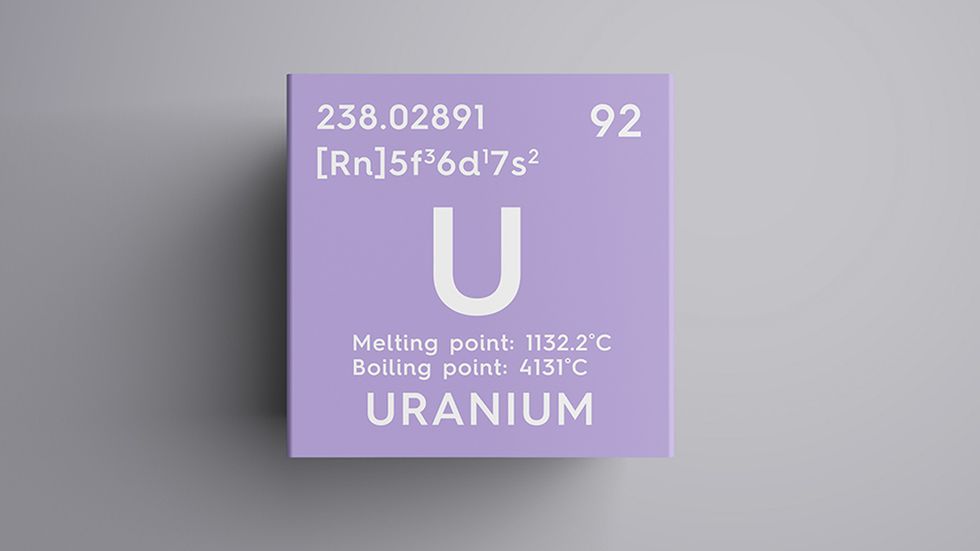
© 2025 Blaze Media LLC. All rights reserved.
Years after the sale of Uranium One to Russia, the motivation behind the purchase is now becoming clear. On the road to dominate the global uranium supply chain, it appears that Russian President Vladimir Putin wants to bankrupt uranium mining companies operating in the U.S.
The sale of Uranium One to the mining arm of Russia’s state-owned nuclear energy company Rosatom, approved by the Obama administration including Hillary Clinton’s State Department, signaled an expansion in Putin’s global uranium ambition. It now appears Putin’s plan was not to export uranium from the U.S. but to manipulate the global uranium market to bankrupt uranium mines operating in the U.S.
Following the purchase of Uranium One, Rosatom has throttled back uranium production in the U.S. Its Willow Creek mine in Wyoming produced 362 tons of uranium in 2013 and only an estimated 47 tons in 2017. The mine stopped production in 2018. All uranium production in the U.S. is at a historic low.
But the acquisition gave Russia access to Uranium One’s mines throughout the world, including Kazakhstan, which allows Russia to circumvent the Russian Suspension Agreement that limits uranium derived from Russian mines to 20 percent of anticipated U.S. demand.
The Russian Suspension Agreement under the U.S. Trade Commission initially stopped Russian uranium sales to the U.S. because of dumping practices. Over time, periodic reviews allowed Russia to sell to the U.S. The agreement will expire in 2020.
The timing of the expiration of the Russian Suspension Agreement fits nicely into Putin’s plan.
Kazakhstan and Russia are tag-teaming an effort to undermine domestic uranium miners by putting them under significant economic pressure. Both countries can produce uranium at lower costs because of inferior environmental standards at their mining operations, and state ownership can subsidize and protect domestic production from market conditions. In addition, Kazakhstan’s export efforts also benefits from devaluation of its currency.
Accordingly, Russia and Kazakhstan are selling uranium at artificially lower prices, undercutting domestic producers. As a result, U.S. mines provide only 11 percent of uranium purchased by U.S. utility nuclear power plants, while 89 percent came from foreign sources in 2016.
Of the uranium import total, Kazakhstan, Russia, and Uzbekistan delivered 38 percent, while Australia and Canada supplied 40 percent to the U.S. The balance came from ten different countries.
On the ropes, two companies that operate uranium mines in the U.S., Ur-Energy and Energy Fuels, are seeking federal government intervention to combat the manipulated market conditions. The companies are asking the Department of Commerce to take action under Section 232 of the Trade Expansion Act of 1962, the federal government mechanism to protect industries vital for national security and threatened by imports.
Predictably, the U.S. utility industry, benefiting from low uranium prices, is fighting the mining companies’ petition, unleashing a lobbying effort to protect their profits.
The utility industry is notorious for flexing its special interest muscle to twist federal policy in its direction. Companies such as Duke Energy and Exelon were big backers of cap-and-trade legislation in 2009, which was essentially the Green New Deal 1.0.
Skyrocketing electricity prices under cap-and-trade, as promised by Obama in 2008, would have helped utility CEOs but punished Americans, especially low- and middle-income families.
From a national security viewpoint, it doesn’t make sense to buy any uranium from Russia, let alone 20 percent, especially since the end goal could be bankrupting companies producing uranium in the U.S.
Without domestic uranium production, the U.S. would be dependent on foreign sources for uranium, including Russia, to feed nuclear power plants that supply 20 percent of our nation’s electricity.
Uranium is also essential for U.S national security, since it’s used for nuclear weapons and powers the Navy’s fleet, including aircraft carriers and submarines, and more of it might be needed to support the planned military buildup under President Trump.
Unknown to most Americans, the U.S. uranium production cycle is on the verge of collapse. In addition to the uncertain future of mining, the only U.S. owned uranium enrichment facility is currently idle.
Ensuring stable domestic uranium mining is a national security issue, and it’s consistent with President Trump’s America-first agenda and his energy plan.
By fighting for cheap foreign uranium, including from Russia, utility CEOs are putting profit before national security.
#mc_embed_signup{background:#fff; clear:left; font:14px; }
/* Add your own MailChimp form style overrides in your site stylesheet or in this style block.
We recommend moving this block and the preceding CSS link to the HEAD of your HTML file. */
Want to leave a tip?
We answer to you. Help keep our content free of advertisers and big tech censorship by leaving a tip today.
Want to join the conversation?
Already a subscriber?
more stories
Sign up for the Blaze newsletter
By signing up, you agree to our Privacy Policy and Terms of Use, and agree to receive content that may sometimes include advertisements. You may opt out at any time.
© 2025 Blaze Media LLC. All rights reserved.
Get the stories that matter most delivered directly to your inbox.
By signing up, you agree to our Privacy Policy and Terms of Use, and agree to receive content that may sometimes include advertisements. You may opt out at any time.


